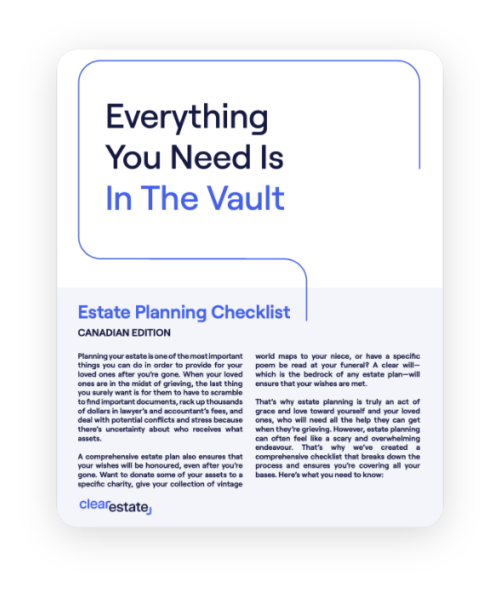Estate Planning
Nov 29, 2024
7 Critical Trust Fund Mistakes Parents Must Avoid in 2025
Setting up a trust fund? Learn the biggest mistake parents make and ensure your child's financial security with expert guidance.
Estate planning is one of the greatest gifts you can give your loved ones. Here’s what you need to know about planning ahead in Ontario.


When we talk about estate planning, we’re not just talking about writing a valid will and keeping it up to date (although that’s important too!). Estate planning is difficult for many to think about, since we understandably don’t like thinking of a time when we may no longer be around. Perhaps estate planning even feels actively morbid to you.
But we’re here to tell you that carefully planning your estate is one of the greatest gifts you can give your loved ones. Once you’re gone, they’ll have to sort through your belongings, your assets, and your debt, and perhaps even go to court and deal with high fees and bureaucratic hurdles. Leaving behind a thoughtful estate plan that you’ve discussed beforehand with your loved ones will ensure that they won’t be burdened with unnecessary stress during an already difficult time.
An estate plan is a dynamic and ongoing process that’s meant to ensure that all of your assets are transferred as seamlessly as possible to the person or people of your choosing, with minimal fees, taxes, and time lost to bureaucratic mazes. A good estate plan is always highly personalized to you and your family and loved ones, and everyone’s ideal estate plan is going to look a little bit different.
However, they mostly share the same goals: Reducing the need for probate or even aiming to skip it entirely, strategies to reduce probate fees and taxes so more of the estate is left for beneficiaries, and ensure that beneficiaries have access to their share of the estate as soon as possible.
Estate plans will often also include precise instructions for funeral arrangements, or perhaps even have some sort of pre-arrangement made with a specific funeral home in order to lock in a specific price.
Creating a comprehensive estate plan may seem daunting, but it all begins with an honest conversation with your loved ones. By maintaining transparency and patience throughout the process, you ensure that your wishes will be executed confidently when the time comes. Let's walk through the essential steps to create your tailored estate plan in Ontario:
Step 1: Identify Key Participants:
Step 2: Create an Inventory of Assets:
You can't create a solid estate plan without knowing the size of your estate.
Create an inventory and approximate value appraisal of all your assets, including:
Step 3: Outline Additional Wishes:
Step 4: Create the necessary legal documents for your estate plan:
Setting up a life insurance policy can be a valuable tool in your estate plan. Look for a policy that covers about 80% of your annual income, projected for the next ten to twenty years. This can provide immediate, tax-free financial assistance to your beneficiaries and help offset estate taxes and debts.
No, an estate plan is not the same as a will in Ontario. A will is just one element of a comprehensive estate plan. Proper estate planning encompasses a broader scope, including several key documents and strategies designed to manage your assets and decisions effectively. These documents typically include:
Thus, while a will plays a crucial role within an estate plan, it does not encompass the entirety of estate planning efforts needed to ensure comprehensive management and transfer of your assets.
Estate planning requires you to have a lot of important documents that are kept in a safe space, and are accessible to your loved ones when they need them. Here are some of the documents that form part of any solid estate plan:
As mentioned above, a valid will is the cornerstone of any good estate plan. Your loved ones will need to show your will to the probate court in order to be able to execute your wishes and receive the inheritance you’ve determined for them.
A living will is also known as a personal directive, and this is a legal document that outlines your instructions for your healthcare and personal care in the case that you’re incapacitated and can no longer advocate for yourself.
While it’s easy to confuse a living will with a POA for personal care, there is a key difference. While a living will establishes specific directions for your care when you’re no longer able to express them, a POA for personal care gives someone else the authority to make healthcare and personal care decisions on your behalf when you’re no longer able to.
This means that instructions don’t need to have been written down ahead of time by you; a POA means you’ve given a person of trust the authority to make decisions for you, whatever those may be (as they’re related to healthcare and personal matters).
A POA for property gives someone you’ve designated as your “attorney” the power to deal with the sale, purchase, and management of all your financial assets, including real estate, in the event that you become incapacitated.
You can read more about POAs in Ontario here.
While not necessary for everyone, trusts can be valuable tools in estate planning. If you decide to include trusts in your plan, you'll need to create the appropriate trust documents. These might include:
Trust documents specify the trustee(s), beneficiaries, assets included, and rules for managing and distributing the trust's assets. They can help with tax planning, asset protection, and ensuring your wishes are carried out as intended.
When we talk about estate planning, it's crucial to consider the impact of capital gains tax. In Ontario, as in the rest of Canada, your estate may face significant tax implications due to capital gains.
Here's what you need to know:
Deemed Disposition: When you pass away, the Canada Revenue Agency considers all your capital property to be sold at fair market value immediately before death. This can result in capital gains tax your estate will need to pay.
Strategies to Minimize Impact: There are several ways to reduce the capital gains tax burden on your estate:
Capital gains tax can significantly impact the value of the estate you leave behind. It's worth having an honest conversation with your loved ones and financial advisors about how to address this in your estate plan.
If you're a business owner, your estate plan needs some extra attention. Your business is likely one of your most valuable assets, and ensuring its smooth transition is crucial for both your legacy and your family's financial security.
Here are some key points to consider:
As a business owner, your estate plan will likely be more complex. It's important to work with professionals who understand the unique challenges you face. Remember, like all aspects of estate planning, your business succession plan should be reviewed regularly to ensure it still aligns with your goals and the current business environment.
Creating a comprehensive estate plan can feel overwhelming, but it doesn’t have to be. Our dedicated professionals can assist you at every step of the way and ensure you leave no ground uncovered. That way, you can rest easy in knowing that you’ve given your loved ones a wonderful gift: The gift of planning ahead.
Get in touch with our professionals today for a free consultation and find out how we can help you create the best estate plan for you and your family.
 Secure Your Legacy
Secure Your Legacy
Get your free 12-step Estate Planning checklist now. 89% of readers complete their estate plan within 3 months of using our guide.
Instantly Access Now